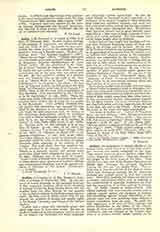

Audin, J.—M.-VINCENT, b. at Lyons in 1793; d. in Paris, February 21, 1851. He first studied theology in the seminary of Argentiere, and afterwards pursued the study of law. He passed his law examination but never practiced his profession, having decided to enter on a literary career. His first publications were: “La lanterne magique” (1811); “Blanc, bleu et rouge” (1814); “Tableau historique des evenements qui se sont accomplis depuis le retour de Bonaparte jusqu’au retablissement de Louis XVIII” (1815). He also contributed to the “Journal de Lyon” founded by Ballanche. He soon left his native city and settled in Paris where he opened a bookstore and at the same time was active with his pen. He first published articles of a political cast, and historical tales in the style of the time, such as “Michel Morin et la Ligue”; “Florence ou la Religieuse”; “Le Regicide”, and others. He then took up historical writing, his first work of this kind being “Le Concordat entre Leon X et Francois Ter” (1821), which is, for the most part, a translation of that document. This was followed by his “Histoire de la St. Barthelemy” (2 vols., 1826). These two works were fairly well received although some ecclesiastical critics accused him of being too favorable to the Protestants. Audin publicly defended himself against this imputation, and asserted his firm belief in the doctrines of the Catholic Church. He now began his most important work, the history of the Protestant Reformation, which he published from 1839 to 1842 in four books, as follows: (I) “Histoire de la vie, des ouvrages et de la doctrine de Luther” (2 vols., Paris, 1839; 2d ed., 3 vols., 1850); (2) “Histoire de in vie, des ouvrages et de in doctrine de Calvin” (2 vols., 1841; 2d ed., 1851); (3) “Histoire de Leon X et de son siecle” (2 vols., 1844; 2d ed., 1851); (4) “Histoire de Henri VIII et du schisme d’Angleterre” (2 vols., 1847; 2d ed., 1862). The author claims to have based his statements upon researches which he made in the archives of various European cities, especially in the archives of the Vatican. The work shows that this assertion cannot be accepted in its entirety. The volumes are written in a romantic manner, and contain many particulars which sober criticism has long proved to be false. Dollinger says of the work on Luther: “Audin’s work is written with an extraordinary, and at times almost naive ignorance of Luther’s writings and contemporary literature, and of the general condition of Germany at that period” (Kirchenlex., s.v. Luther).
J.P. KIRSCH

